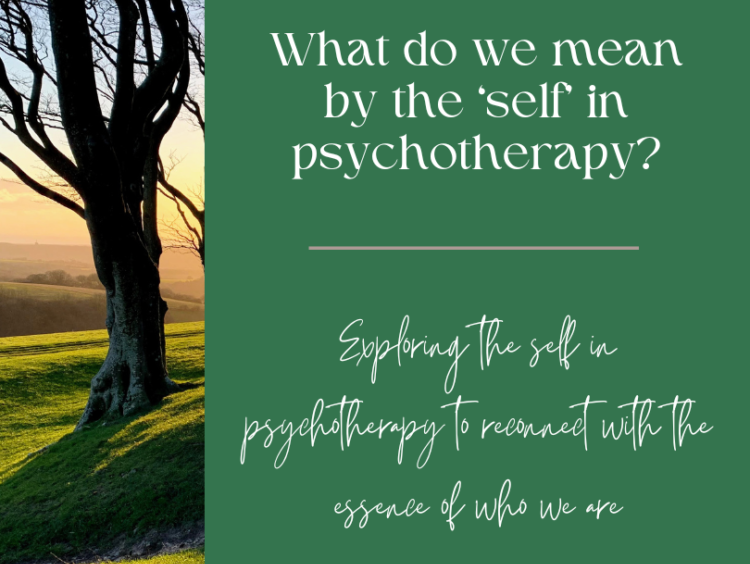What Do We Mean by ‘The Self’ in Psychotherapy?

Understanding the Concept of the Self
The concept of “the self” is central to psychotherapy, yet it can feel elusive and abstract. As therapists, we often talk about self-awareness, self-development, and even self-care, but what exactly do we mean by the term ‘self’ in a psychotherapeutic sense? We may generally confidently use these terms on a regular basis and have a good understanding of what it is we are referring to but would we be able to define the concept of self if asked? Understanding the self is crucial for anyone considering psychotherapy, as much of the therapeutic process revolves around exploring and nurturing it.
What Is the Self?
In simple terms, the self refers to our sense of who we are—the unique combination of our thoughts, feelings, behaviours, and experiences that shape our identity. It encompasses both the parts of ourselves that we are aware of (what we know about ourselves) and the deeper, unconscious aspects that we may not fully understand (the bits we don’t know about ourselves). Put another way, it is our authentic self. Psychotherapy aims to bring these hidden layers into awareness, allowing us to build a more coherent and compassionate relationship with ourselves.
The Development of Self Model in Relational Transactional Analysis
In Relational Transactional Analysis, a branch of psychotherapy that focuses on human interactions and relationships, we use a framework known as the ‘Development of Self’ model. This model outlines how the self develops through our early life experiences, particularly in relationships with significant others. Our self-concept is shaped by the messages we receive from caregivers and our environment, influencing how we perceive ourselves and relate to the world around us.
Increasing Self-Awareness Through Therapy
One of the key aims of psychotherapy is to increase self-awareness. This involves recognising patterns in our thoughts and behaviours that may have developed as coping mechanisms during childhood but are no longer helpful in adulthood. For example, someone who learned to suppress their emotions to avoid conflict may continue to do so unconsciously, leading to difficulties in relationships. By exploring these patterns, we can begin to make conscious choices about how we respond to life’s challenges.
Embracing Self-Development
Self-development, another important concept in therapy, involves nurturing the parts of ourselves that may have been neglected or underdeveloped. It’s about embracing our potential and fostering personal growth. Therapy provides a safe space to explore who we truly are—beyond societal expectations or past experiences—and to develop a stronger, more authentic self.
The Journey of Self-Discovery
Ultimately, exploring the self in psychotherapy is about reconnecting with the essence of who we are. It allows us to move beyond automatic responses and habitual patterns, opening the door to greater freedom, self-acceptance, and fulfilment. For anyone considering psychotherapy, this journey of self-discovery can be profoundly life-changing. If you are interested in looking at your own self in a therapeutic way get in touch to find out more about how we could work together.
You may also be interested in...

Is Time Really a Healer?
Pop Culture and Loss I recently finished the Netflix series One Day. (Spoiler alert—if you haven’t seen it yet, you might want to pause here and come back once you…

What is Mature Love?
Creating Meaningful Connections Mature love, what is it? I’m not talking about being 80 years old and holding hands on a walk through the park here. I am talking about…

Your Life Story
Your Life Story One of the core theories of Transactional Analysis is the notion of a life script. Put simply, a life script is a pre-conscious life plan that determines…

Improve Your Mental Strength
Ever wondered why some people seem to bounce back effortlessly from life's curveballs while others struggle to regain their footing? The secret lies in mental strength – that intangible power…

The Early Clues To Adult Personality
As new parents we strive to see early clues in our baby's temperament to see if we're able to guess what they may be like as adults. But how far…

Navigating Couples Therapy When Your Partner Isn’t on the Same Page
Deciding to seek couples psychotherapy can be a significant step toward improving your relationship. When you opt for the modality of Transactional Analysis (TA), it demonstrates your commitment to understanding…
Ready to Make a Change? Book an Initial Consultation Today
If you have any questions at all about therapy or would like to make an appointment, get in touch. I will usually be able to respond to you within 24 hours.
